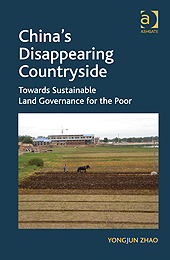Resource information
China’s land policy has been in the news frequently over the last few weeks, since the Chinese government announced it will reform its land policy in the wake of the Third Plenum last November.
For those who do not know the Chinese land system follows a brief introduction:
Essentially, China distinguishes between two different types of ownership regimes: the urban and the rural ownership regime. All urban land is owned by the state, while rural land is “collectively owned”. Article 10 of the Chinese constitution states this as follows: “All urban land is owned by the state. Land in rural and suburban areas is own by collectives except for those portions which belong to the state in accordance with the law; house sites and private plots of cropland and hilly land are also owned by collectives”.
For the farmers in China, who make up almost half of the nation, living on rural land, this means that they are part of a collective community and have property rights to their land, but with important restrictions. Their property rights are based on a “household responsibility system”, in which the farmers are granted the right to farm on individual parcels of land based on a contractual agreement with the collectives. In exchange for certain obligations, such as the payment of taxes or production quotes, the farmers have the right to any residual income earned from farming the land, as well as the right to make all decisions regarding agricultural production on the land.
While this hybrid rural land tenure system has contributed to agricultural development, it is interwoven with rising farmland loss and social conflicts. Two important restrictions to the rights of farming make the Chinese land tenure system vitally different from those in Western countries. The first restriction is that to the right of mortgage; the law does not permit holders or rural ‘land use rights’ to mortgage the underlying property.
A second restriction is a restriction of use applicable to the underlying land. An underlying principle of collectively-owned land is that the default use of this land is for agricultural purposes. Agricultural land may not be converted to other uses without the approval of the relevant county government, which is bound by the national law on this subject.
Yongjun Zhao’s book examines the linkages between land tenure, development and governance, in the context of China’s development transformation. Drawing on empirical studies, it advocates the exploration of innovative land tenure systems that address the wider determinants: institutions, power, politics and social development. It argues that a land tenure system can only be sustainable when it is compatible with the overall biophysical, social, political and economic conditions. This new institutional lens into the condition and dynamics of land tenure systems marks a paradigm shift away from those focusing on the narrow meaning of land rights and tenure security strengthening, as these approaches can paradoxically contribute to weaker land and resource governance.
Contributing to an enhanced understanding of the challenges China faces in agricultural development and natural resource governance and to the international debates on land tenure reform, this book will be of interested to researchers, practitioners, policy-makers and students in development studies, anthropology, sociology, political sciences, law, geography, economics, public administration and other relevant disciplines. The lessons learnt from China also shed light on its global engagement on sustainable development and governance issues.
-----
For anyone who is interested in discussing this book or the subject of China's land policies, please feel free to get in touch with Yongjun Zhao.
- Source of background information: article by Robin Dean and Tobias Damm-Luhr

